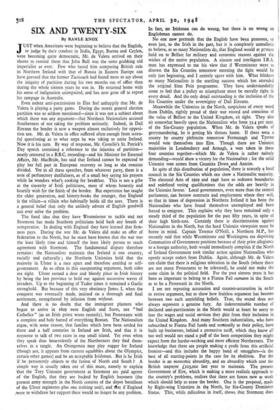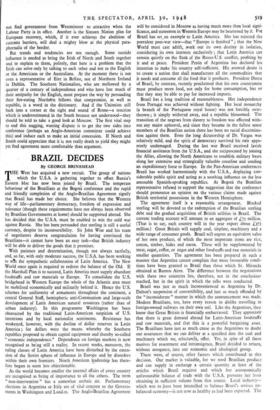SIX AND TWENTY-SIX
By RAWLE KNOX
JUST when Americans were beginning to believe that the English, to judge by their conduct in India, Egypt, Burma and Ceylon, were becoming quite democratic, Mr. de Valera arrived on their shores to remind them that John Bull was the same grabbing old imperialist as ever. Few who heard him comparing British rule in Northern Ireland with that of Russia in Eastern Europe can have guessed that the former Taoiseach had found more to say about the iniquity of partition during his two months out of office than during the whole sixteen years he was in. He returned home with his sense of indignation unimpaired, and has now gone off to repeat his rampage in Australia.
Even ardent anti-partitionists in Eire feel unhappily that Mr. de Valera is playing a party game. During the recent general election partition was so seldom mentioned—since it was not a subject about which there was any argument—that Northern Nationalists accused Southerners of not taking the problem seriously. Indeed, in Dail Eireann the border is now a weapon almost exclusively for opposi- tion use. Mr. de Valera in office suffered often enough from scorn- ful questioning as to what steps he was taking to unite Ireland. Now it is his turn. By way of response, Mr. Costello's St. Patrick's Day speech contained a reference to the injustice of partition— neatly censored in a B.B.C. recording—and his Minister for External Affairs, Mr. MacBride, has said that Ireland cannot be expected to play her full part in European recovery so long as she remains divided. Yet in all these speeches, from whatever party, there is a note of perfunctory dutifulness, as of a small boy saying his prayers while he wonders what's cooking for breakfast. This is not a gibe at the sincerity of Irish politicians, most of whom honestly and heartily wish for the finish of the border. But experience has taught the older generation, and history-books the younger, that England is the villain—a villain who habitually holds all the aces. There is a general belief that only the unlikely advent of English goodwill can ever solve the problem.
The fixed idea that they have Westminster to tackle and not Stormont has made Southern politicians hold back any breath of compromise. In dealing with England they have learned that firm- ness pays. During the war Mr. de Valera did make an offer of federation to the North, but he must have known that the war was the least likely time and himself the least likely person to reach agreement with Stormont. The fundamental dispute therefore remains: the Nationalists maintain that Ireland is one country, racially and culturally ; the Northern Unionists hold that the majority in Ulster is a race apart and therefore entitled to self- government. As so often in this exasperating argument, both sides are right. Ulster earned a dear and bloody place in Irish history by being the last province to hold out against successive waves of invaders. Up to the beginning of Tudor times it remained a Gaelic stronghold. But because of this very obstinacy James I, when the conquest was eventually made, insisted on a thorough and final settlement, strengthened by infusion from without.
And there is no doubt that the immigrant planters who began to arrive in 1609 were English and Scots, not "bad Catholics" (as an Irish priest wrote recently), but Protestants with a complete and holy hatred of everything Roman. The Nationalists argue, with some reason, that families which have been settled for three and a half centuries in Ireland are Irish, and that it is nonsense to talk of two races in one small island. Yet even when they speak thus benevolently of the Northerners they find them- selves in a tangle. An Orangeman may play rugger for Ireland (though not, it appears from current squabbles about the Olympics, certain other games) and be an acceptable Iriihman. But is he Irish if he persistently objects to the fusion of North and South ? A simple way is usually taken out of this maze, namely to explain that the Tory Unionist government at Stormont are paid agents of the English, that they are backed by English bayonets (the present army strength in the North consists of the depot battalions of the Ulster regiments plus one training unit), and teat if England were to withdraw her support there would no longer be any problem. In fact, no Irishman can do wrong, but there is no wrong an Englishman cannot do.
No one now pretends that the English have been generous, or even just, to the Irish in the past, but it is completely unrealistic to believe, as so many Nationalists do, that England would at present hold on to Belfast for military and economic reasons against the wishes of the native population. A sincere and intelligent I.R.A. man has expressed to me his view that if Westminster were to disown the Six Counties tomorrow morning the fight would be only just beginning, and I entirely agree with him. What blinkers so many Nationalists is the startling success which has attended the original Sinn Fein programme. They have understandably come to feel that a policy so triumphant must be morally right in every detail. And the only detail outstanding is the inclusion of the Six Counties under the sovereignty of Dail Eireann.
Meanwhile the Unionists in the North, suspicious of every word from Dublin, rightly proud of their war record and conscious of the value of Belfast to the United Kingdom, sit tight. They also sit somewhat heavily upon the Nationalists who form 33.4 per cent. of the Six-County population. When Mr. de Valera speaks of gerrymandering, he is getting his thrusts home. If there were a county by county plebiscite tomorrow Fermanagh and Tyrone would vote themselves into Eire. Though there are Unionist majorities in Londonderry and Armagh, a vote taken in these four counties together—which Mr. de Valera is rather naïvely demanding—would show a victory for the Nationalists ; for the solid Unionist vote comes from Counties Down andAntrim.
In spite of this distribution of population, there is scarcely a local council in the Six Counties which can show a Nationalist majority. The electoral Acts of 1929 and 1946 have so redrawn boundaries and redefined voting qualifications that the odds are heavily in the Unionist favour. Local governments, even more than the central parliament, can bestow contracts and employment where they will, so that in times of depression in Northern Ireland it has been the Nationalists who have found themselves unemployed and been forced to emigrate. This explains why they have remained only a steady third of the population for the past fifty years, in spite of their high birth-rate. Certainly there is discrimination against Nationalists in the North, but the hard Unionist viewpoint must be borne in mind. Captain Terence O'Neill, a Northern M.P., has recently said that while Westminster and Washington are depriving Communists of Government positions because of their prior allegiance to a foreign authority, both would immediately complain if the North of Ireland Government took similar action against Nationalists who openly accept orders from Dublin. Again, although Mr. de Valera can claim that there is religious toleration in the South (where there are not many Protestants to be tolerated), he could not make the same claim in the political field. For the past sixteen years it has been as important to belong to a Fianna Fail cumann in the South as to be a Protestant in the North.
I am not repeating accusation and counter-accusation in order to revive argument, but to show how fruitless argument has become between two such unyielding beliefs. True, the sound does not always represent a genuine fury. An indeterminable number of declared anti-partitionists in the North would at heart be sorry to lose the wages and social services they gain from their inclusion in the United Kingdom. And many Southern industrialists, who have subscribed to Fianna Fail funds and nominally to their policy, have built up businesses, behind a protective tariff, which they know all too well would not stand a puff of the keen competition they might expect from the harder-working and more efficient Northerners. The knowledge that there are people making a profit from this artificial frontier—and this includes the happy band of smugglers—is the best of all starting-points in the case for its abolition. For the border is an economic absurdity, and an absurdity which cost the British taxpayer £103,000 last year to maintain- The present Government of Eire, which is making a more realistic approach to the country's problems, realises that there are forces now at work which should help to erase the border. One is the proposal, made by Right-wing Unionists in the North, for Six-County Dominion Status. This, while ridiculous in itself, shows that Stormont does not find government from Westminster so attractive when the Labour Party- is in office. Another is the Sixteen Nation plan for European recovery, which, if it ever achieves the abolition of customs barriers, will deal a mighty blow at the physical para- phernalia of the border.
But trends and tendencies are not enough. Some outside influence is needed to bring the Irish of North and South together and to explain to them, politely, that here is a problem that the Irish can solve only by talking to each other and not to the English or the Americans or the Australians. At the moment there is not even a representative of Eire in Belfast, nor of Northern Ireland in Dublin. The Southern Nationalists, who are mellowed by a quarter of a century of independence and who have lost much of their antipathy for the English, must prepare the way by persuading their fire-eating Northern fellows that compromise, as well as republic, is a word in the dictionary. And if the Unionists still back into a corner at the sight and sound of Rome—a reaction which is underestimated in the South because not understood—they should be told to take a good look at Moscow. The first vital step to end this nagging, wasting dispute is to get the two sides into conference (perhaps an Anglo-American committee could achieve this) and induce each to make an initial concession. If North and South could appreciate that it is not really death to yield they might yet find agreement more comfortable than argument.































 Previous page
Previous page